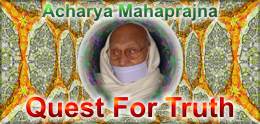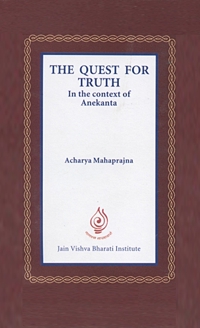
The sixth century BC was a period of attainment in the field of realization of truth. In this period there were Mahavira and Buddha on the Indian scene, LaoTse and Confucious on the Chinese scene, while in Europe stalwarts like Pythagoras were unlocking the secrets to truth.
They were separated by geographical boundaries. Their works are eloquent of the fact that truth is eternal. It is not divided by place or time.
By the ninth century BC a great sage (Tirthankar) of the Jaina tradition, Bhagvan Parshav had already come into existence. His contention was that truth is relative.
The Upanishads were coming into being at that time. The sages of the Upanishdic tradition were defining truth on the basis of Neti-neti. Till the time of Mahavira it was being revised.
The Buddha said truth is inexplicable.
LaoTse said truth cannot be worded.
Mahavira said: 'Just as truth cannot be worded, it can also be worded. If it is unreal to accept that truth can be worded it is equally unreal to think that truth cannot be worded.
Reality is obtained by bringing about a balance between these two options.
Balance is defined as the co-existence of two apparently opposing forces.
In the material world there is complete balance and co-existence.
It is our intellect that has visualized opposites.
The pairs, creation and. destruction, birth and death, permanence and impermanence go hand in hand.
Mahavira's senior disciple Gautam once asked him:
"Lord! What is truth?"
"It cannot be told."
"Then how do we know it?"
"You search for it yourself."
"But how to search for it?"
"Give up karma, do not fill your mind with thoughts, keep silent and keep the body still."
"Lord, but how will there be life then?"
"Restrain your activities. Speak only if you have to but with restraint. Walk only if you have to but with restraint. Eat if you have to but with restraint. Do everything but with restraint."
"Lord, if the path to truth can be told then why can truth not be told?"
"This is partial truth. Partial truth can be worded. I express relative truth. Complete truth can never be given expression to. Therefore I say that truth cannot be expressed. Truth is expressible and inexpressible and a relative understanding of the two is right knowledge."
 Acharya Mahaprajna
Acharya Mahaprajna


